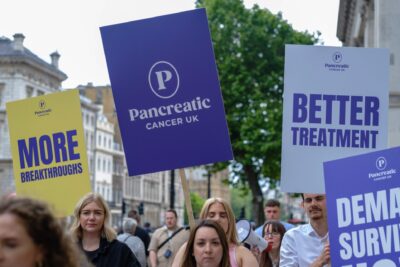



Our response to the new National Cancer Plan consultation
Secretary of State for Health and Social Care, Wes Streeting has announced the consultation on a new National Cancer Plan. The announcement follows an event where he met with our organisation, other cancer charities, and people affected by the disease to talk about the future of cancer care.
To mark World Cancer Day, Macmillan hosted an event at Westminster where the Secretary of State for Health and Social Care, Wes Streeting spoke to BBC presenter, Nick Robinson about the Government’s vision for cancer care. Members of the cancer community were brought together to share their experiences, with learnings from these discussions going on to help shape the new Cancer Plan.
The Government’s plan must reject the historic nihilism surrounding pancreatic cancer and take specific actions to improve survival.
The event marked the start of a vital conversation with cancer experts, patients, and healthcare professionals, which will influence the standard of care people diagnosed with cancer receive in the future within the UK.
Responding to the launch of the consultation phase for the new National Cancer Plan, our CEO, Diana Jupp commented: “A new cancer plan has been desperately needed for years to drive progress on pancreatic cancer and other less survivable cancers which, unacceptably, have been left behind. The consultation announced today is a positive first step and we urge the Government to ensure the voices of people affected by pancreatic cancer are heard.
“As the deadliest common cancer, the disease has been written off for decades as too difficult to diagnose and too difficult to treat. Tragically, as a result, more than half of people with pancreatic cancer still die within just three months of their diagnosis.
“The Government’s plan must reject the historic nihilism surrounding pancreatic cancer and take specific actions to improve survival. To do so, it must prioritise taking concrete steps to improve early diagnosis, implementing an optimal care pathway and ensure patients have access to better, more effective treatments. After 50 years during which there has been barely any improvement in survival rates, people affected by this devastating cancer deserve more than hope, they need action.”

